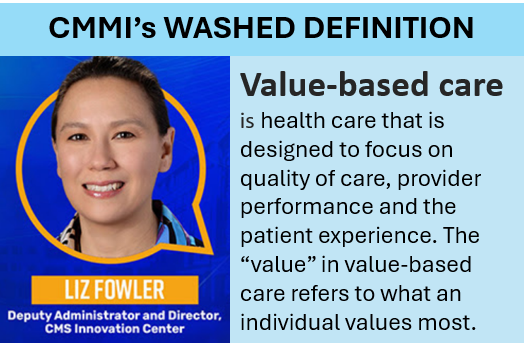 Wil Rutt, MD, the founder of the Center for Clinical Effectiveness and my boss during the 1990’s at Henry Ford Health System, is retired. But, he still has an interest in the improvement of our health care system, and he still sends interesting articles to provoke thought and constructive dialog. This week, Dr. Rutt sent two New York Times articles, asking for a response. I found it interesting that both articles, seemingly unrelated on the surface, have in common a failure to appreciate the value of free, competitive markets in health care.
Wil Rutt, MD, the founder of the Center for Clinical Effectiveness and my boss during the 1990’s at Henry Ford Health System, is retired. But, he still has an interest in the improvement of our health care system, and he still sends interesting articles to provoke thought and constructive dialog. This week, Dr. Rutt sent two New York Times articles, asking for a response. I found it interesting that both articles, seemingly unrelated on the surface, have in common a failure to appreciate the value of free, competitive markets in health care.
Supreme Court Decision on Health Care Reform
In the first article, Adam Liptak discusses the upcoming Supreme Court decision regarding the health care reform law, describing it as a career-defining decision for Chief Justice Roberts. Conservative political leaders are against the law. Many such leaders have argued against the constitutionality of the law on the grounds that the mandate that people purchase health care insurance extends the power of the federal government to regulate interstate commerce beyond the intentions of the framers of the constitution. This debate is interesting in that it cuts across different facets of conservative thought: the libertarians, the free-marketers and the “haves.” The libertarian-leaning side of conservative thought focuses on maximizing personal liberty by minimizing government power. The argument against the health care reform law’s expansion of federal commerce powers is completely consistent with this aspect of conservatism. This argument is also aligned with the interests of the “haves” (recently re-labeled the “1%” by those at the opposite end of the political spectrum). Except perhaps for Warren Buffet, who argued in a NY Times Op Ed that tax rates should be increased for anyone with annual income over $1 million, wealthy Americans are usually not eager to foot the bill for social benefits for others, particularly not for expensive and rapidly escalating health care benefits.
But, the free-marketers seem to be taking a back seat on this issue. Free marketers are skeptical that a monopoly provider of health care insurance services will be efficient and maximize value. For this reason, free marketers loathe the notion of a federal government-run single payer system. They prefer a market with multiple competing private health insurance providers, with just enough government regulation to ensure that competition is real and that consumers are properly informed and protected. Such a competitive private market has worked well for property and casualty insurance, where the risk of loss can be assessed by the insurer almost as well as by the insured. But, in health insurance, the insured have superior knowledge of their own health status. Therefore, it is a widely held belief by health economists that if insurers are to be forced to offer insurance to everyone, it is necessary to have a mandate for people to purchase insurance to make a private health insurance system work. Without such a mandate, health economists fear that too many people will wait until they know they are sick to buy insurance, forcing insurers to raise rates. This dynamic is described as “adverse selection” and is thought to eventually lead to a death spiral where private insurers fail. According to this view, if you don’t mandate the purchase of private health insurance, you are implicitly sabotaging a free, competitive market for health insurance that can support near-universal coverage. The only alternatives are a government monopoly, paid for with mandatory taxes, or a continuation of a broken system that fails to insure tens of millions of Americans.
It seems to me that a coalition of the libertarians and “haves” within the conservative community have overpowered the free-marketers. Republican presidential candidates are being forced to reject the mandate as a condition of being worthy of being a “true conservative” (despite the fact that both Gingrich and Romney have supported such mandates in the past!).

Remember Milton Friedman, the Nobel laureate economist from the University of Chicago? He used to be considered a conservative. He was a free market conservative. He advocated for universal tax-funded high deductible health insurance, administered by the government or through vouchers that could be used to purchase such insurance from private insurance companies. He advocated for the elimination of Medicare and Medicaid, the elimination of tax exemption for employer-provided health insurance benefits, and for the adoption of medical savings accounts. All of these proposals were aimed at having consumers bear the costs of non-catastrophic medical care so that free market mechanisms apply, as they already do for other necessities of life such as food and shelter. If Dr. Friedman were alive today, he would probably not pass the current test of being a “true conservative.” I call for the free-marketers to speak up.
America Stealing Doctors from Third World
In another New York Times article served up by Dr. Rutt, Matt McAllester describes the “brain drain” of physicians from third world countries who seek training in the U.S. and then stay in the US. Such physicians stay because they will have access to the latest technology and they can make ten times the salary they would earn in their native countries. The article portrays this as unethical behavior by the US that harms the third world countries. The article does not advocate for any particular remedy.
In my opinion, it is necessary to take a broader view. This medical brain drain problem is an undesirable side effect of a larger trend that has greatly benefited the third world. As described in a compelling and entertaining way by Hans Rosling, the last century has been characterized by dissemination of scientific and economic innovations throughout the world which has lifted up third world countries in terms of health and economic advancement. The free flow of capital, goods, labor and ideas across the world has been the driver of this broad advancement. This amazing global success (with some tragic exceptions such as with the AIDS epidemic holding down Sub-Saharan Africa), has been underappreciated by those who fight against “globalization.”
In this context, should we try to protect third world countries from brain drain by constraining the existing freedom of the world market for physician services and therefore constrain opportunities for physicians from those countries? I don’t think so.
















